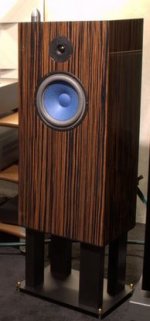I probably don't know as much as you think I do, but thanks for the vote of confidence 😉
Of course I know you know a lot 😉 But your comments often sound like you don't know if others know. That comment about the shape of dome tweeter and dust cap makes either me or Snup or both look stupid 😀
I apologise if I came off the wrong way here, but indeed I don't know what others know, and I don't know who else is reading along. On a written forum being understood sometimes takes a lot of writing.But your comments often sound like you don't know if others know.
No, I don't know the reason why.But it is irrelevant of the light cone discussion, as you know the reason why.
On a written forum being understood sometimes takes a lot of writing.
Yes, especially when the sentence is full of grammatical error like mine 😀 And even if my grammar is fine (actually my toefl score is close to perfect) I have a different way of thinking (a complex mind, my boss once said) such that in real life my words (the exact real content) are hard to be understood. But that's off topic 😛
Shock and horror, a nerd on a technical forum 😀 No, I don't have a problem with how you write. Now and then the S/N causes a little confusion though (you did come through though about your drivers 😉 ).
Yes..I too am so smart it's difficult to put my intelligence into words simple folk can comprehend.
Sent from my iPad using Tapatalk
Sent from my iPad using Tapatalk
I'd go the two way due to the quicker throttle response and the forgiveness if I stop to open a packet of chips. The three way has auto-pilot but that would be like using DSP as a volume control.I could not agree more. Full range, 2 way and 3 way.
..and some champagne and beer for the loving crowd in the back seat.
Pilot remains sober at all times, prime directive. Cheers!
Pilot remains sober at all times, prime directive. Cheers!
Last edited:
I have spent an interesting day looking at the reflex Audio Note AN-E which incorporates a lot of our thinking on dynamic drivers, put together in one post:
http://www.diyaudio.com/forums/multi-way/147632-classic-monitor-designs-17.html#post4358469
Martin Andersen as the OP, rightly notices that Troels' TQWT incorporates a lot of the ideas:
TQWT-DTQWT-T35C002
http://www.diyaudio.com/forums/multi-way/147632-classic-monitor-designs-17.html#post4358469
Martin Andersen as the OP, rightly notices that Troels' TQWT incorporates a lot of the ideas:
TQWT-DTQWT-T35C002
Attachments
Everybody have a look, before posting shite !
….shite like this one?
You can just sit in front of your PC speaker and nod your head to a 10kHz sinewave. Or have you done that while writing all your posts ?
My Genelec are no "loud" speakers. They can play max 107db/1m before hitting limiters and shut off. However, that means that I can putter along around 87db/1m and still have dynamic range for the best of my recording around 20db. Ergo, for my needs I have dynamic loudspeakers.
Even better, my noise floor is around 23db which is kind of amazing, as I live in centre of town about 500 000 inhabitants. Wow, now we have a speaker with 74db head room…..
What kind of dynamic speakers (shite) you are talking about I have no clue…..
It's very hard work posting serious stuff with the Peanut Gallery here posting rubbish. 😀
I don't care. The peanut gallery is clearly listening to bad speakers. More fool them. 😛
I have enjoyed learning about Audio Note woofers.
Audio Note Woofers | Hifi Collective
Thanks, snup. 😎
I don't care. The peanut gallery is clearly listening to bad speakers. More fool them. 😛
I have enjoyed learning about Audio Note woofers.
Audio Note Woofers | Hifi Collective
Thanks, snup. 😎
Anyway, hear the wise words of our very own Joachim Gerhard:
Later, in the 80's, manufacturers started to add more mass, they added more damping, and they made surrounds with high loss. That gave an extremely flat frequency response, but also a lot of energy storage. This compared, the old drivers were much quicker. They had some resonances, but you could get rid of that in the crossover. It was this run for flat response that gave a lot of modern drivers this dull, uninteresting sound. And you can also measure higher second and third harmonic distortion in some of them.
This is one of those statements which let my toenails always rollup whenever I read them.
Damping and "high loss" are energy storage? In which universe, please?
1.) damping and (high) loss are exactly the same. No losses - no damping.
2.) if there are losses, then there can't be storage, because that's what the word says: energy gets lost, not stored.
3.) Resonances instead... ARE energy storage
So he totally reverses physics to prove his point (or, to be less polite: promote his speakers).
However, he's not completely wrong: modern speakers with high loss DO sound uninteresting. That's what they made for. A speaker which is designed to sound as correct (aka reproducing the recording) as possible IS uninteresting. A speaker which sounds spectacular (or "dynamic") is not sounding correct. Which does not mean that you shouldn't like it.
- Status
- Not open for further replies.
- Home
- Loudspeakers
- Multi-Way
- Discussion - What makes a speaker sound dynamic
